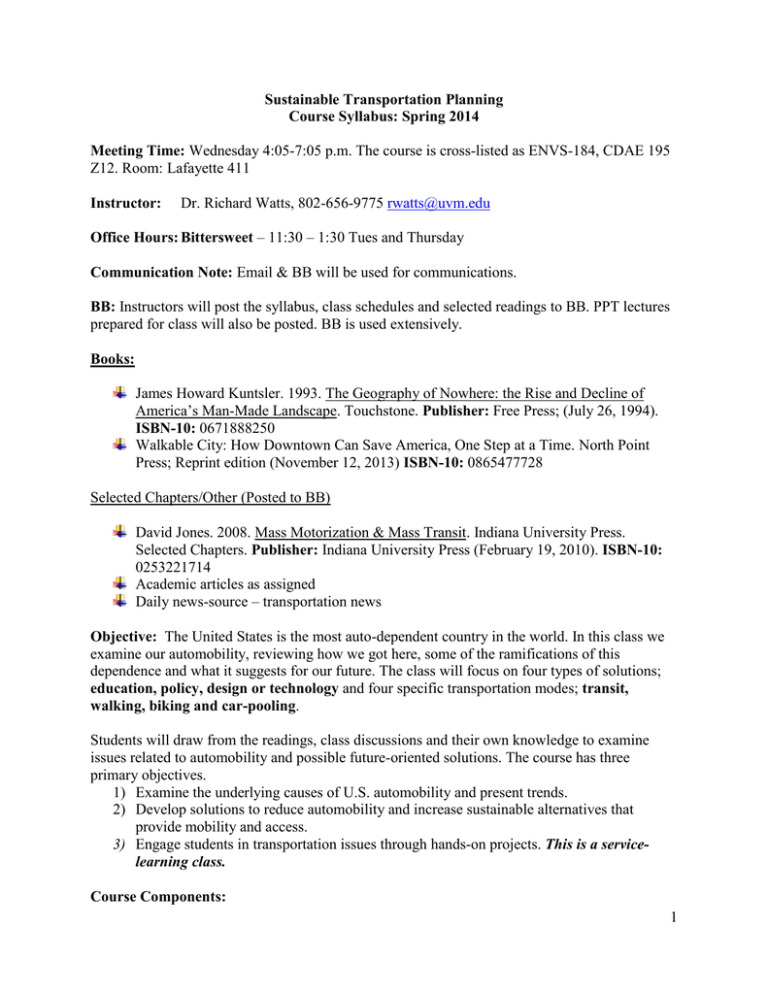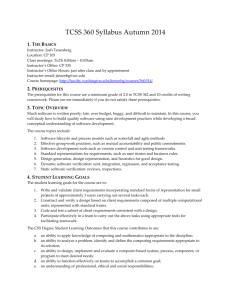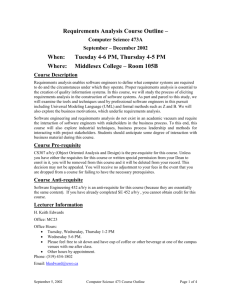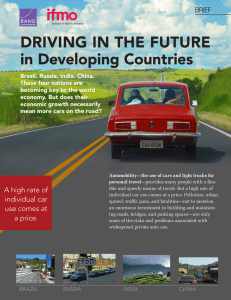ENVS 195
advertisement

Sustainable Transportation Planning Course Syllabus: Spring 2014 Meeting Time: Wednesday 4:05-7:05 p.m. The course is cross-listed as ENVS-184, CDAE 195 Z12. Room: Lafayette 411 Instructor: Dr. Richard Watts, 802-656-9775 rwatts@uvm.edu Office Hours: Bittersweet – 11:30 – 1:30 Tues and Thursday Communication Note: Email & BB will be used for communications. BB: Instructors will post the syllabus, class schedules and selected readings to BB. PPT lectures prepared for class will also be posted. BB is used extensively. Books: James Howard Kuntsler. 1993. The Geography of Nowhere: the Rise and Decline of America’s Man-Made Landscape. Touchstone. Publisher: Free Press; (July 26, 1994). ISBN-10: 0671888250 Walkable City: How Downtown Can Save America, One Step at a Time. North Point Press; Reprint edition (November 12, 2013) ISBN-10: 0865477728 Selected Chapters/Other (Posted to BB) David Jones. 2008. Mass Motorization & Mass Transit. Indiana University Press. Selected Chapters. Publisher: Indiana University Press (February 19, 2010). ISBN-10: 0253221714 Academic articles as assigned Daily news-source – transportation news Objective: The United States is the most auto-dependent country in the world. In this class we examine our automobility, reviewing how we got here, some of the ramifications of this dependence and what it suggests for our future. The class will focus on four types of solutions; education, policy, design or technology and four specific transportation modes; transit, walking, biking and car-pooling. Students will draw from the readings, class discussions and their own knowledge to examine issues related to automobility and possible future-oriented solutions. The course has three primary objectives. 1) Examine the underlying causes of U.S. automobility and present trends. 2) Develop solutions to reduce automobility and increase sustainable alternatives that provide mobility and access. 3) Engage students in transportation issues through hands-on projects. This is a servicelearning class. Course Components: 1 A : Seminars Lectures by the instructor and limited speakers will include presentation of background information, description of current transportation challenges, solution mechanisms and class discussions. Attendance and participation in discussions is mandatory and will be considered in assigning the final grade. B : Readings Required readings are posted to Blackboard. Students are required to complete these readings and use them as a source for questions of speakers, for class discussion and in written materials. C: Short Papers There will be 5 short papers assigned in this class. Students must submit 4 papers over the course of the semester. Papers should be 1-2 pages single-spaced and draw from the readings, class discussions, the academic literature and the student’s own research. Re-writes of these papers are not allowed. Late papers are not allowed. Instructor grades these papers based on 1) Clarity and organization of the writing (including typos), 2) Quality of content and originality, 3) Use of class materials and related transportation research resources. D: In-Class Assignments There will be four in-class writing assignments in this class that relate to the readings and class discussions. E. Class-project There will be one semester long project in which students work in groups with a community sponsor to conduct research and applied work related to the class (See Assignments). F : Grading Short Papers Class Participation (per ½ course) In-Class Assignments Class-project 4 x 8%= 2 x 12%= 4 x 2.5%= 1 x 32% = 32% 24% 10% 33% 90 - 100=A 80 - 89 =B 70 - 79 =C G. Class participation Over the course of the semester you must submit ten items to BB, these can include short writeups of transportation-related events you attend, news articles, video clips, comments on each others postings, reviewing each others papers etc. Get about half of these done by the break and half after the break. You must attend two events outside of class related to transportation as part of your class participation grade & write short summaries of the event (see Assignments). H. Presentations on “Home” (not graded) 1-3 slides about home that could illustrate; where it is, what the local transportation systems are, how you get around, some data about this. (See Assignments). 2 Guidelines for Written Work All written work should be submitted to BB. Use your own words. Please don’t take lengthy quotes from the literature, instead present your thoughts in your own words. But always give credit when you use ideas from other sources. Any consistent referencing style is acceptable. Late Work You are expected to turn in all work on-time i.e. the day it is due in class. If you need an extension due to illness or family emergency, please speak with me personally and well in advance of the due date or class time. I do not accept late work when there has been no prior acceptance (an email announcing the work will be late is not enough. Acceptance requires acknowledgement by the instructor). And because there are 5 papers and 4 actually due, late work is generally not allowed. Attendance Policy You are expected to attend every class session. If unable to attend please contact Richard either by phone or email in advance of the class and ask permission. I expect everyone to attend every class, both for your own personal learning, and to contribute to the community of learners in the group. In addition, class participation is a portion of your grade. Because the class meets only 15 times, unexcused absences can result in grade reductions of one point (i.e. from an A to an A-). Class Protocol Use of cell phones and text messaging is not allowed. Laptops should be used sparingly and only for class-related work during class. Students are welcome to get up and move around during class. Using cell phones during class will result in grade point reductions. Plagiarism Academic standards at UVM about plagiarism are clear: “All ideas, arguments, and phrases, submitted without attribution to other sources, must be the creative product of the student. Thus, all text passages taken from the works of other authors must be properly cited. The same applies to paraphrased text, opinions, data, examples, illustrations, and all other creative work. Violations of this standard constitute plagiarism” (www.uvm.edu/~uvmppg/ppg/student/acadintegrity.html). Please be careful with attributions and copying, especially when using web pages. Plagiarism at UVM is grounds for academic suspension. 3







